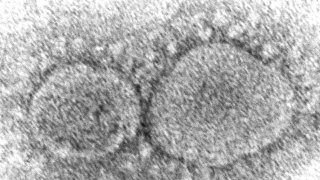
The coronavirus mutant that is currently dominant in the United States is a member of the omicron family but scientists say it spreads faster than its omicron predecessors and is adept at escaping immunity.
Why? Because it combines properties of both omicron and delta, the nation's dominant variant in the middle of last year.
A genetic trait that harkens back to the pandemic's past, known as a “delta mutation," appears to allow the virus "to escape pre-existing immunity from vaccination and prior infection, especially if you were infected in the omicron wave," said Dr. Wesley Long, a pathologist at Houston Methodist in Texas. That's because the original omicron strain that swept the world didn’t have the mutation.
The omicron “subvariant” gaining ground in the U.S. — known as BA.2.12.1 and responsible for 62% of U.S. COVID-19 cases last week — isn't the only one affected by the delta mutation. The genetic change is also present in the omicron relatives that together dominate in South Africa and are gaining traction in the U.S. - BA.4 and BA.5. Those have exactly the same mutation as delta, while BA.2.12.1 has one that's nearly identical.
Feeling out of the loop? We'll catch you up on the Chicago news you need to know. Sign up for the weekly Chicago Catch-Up newsletter here.
This genetic change is bad news for people who caught the original omicron and thought that made them unlikely to get COVID-19 again soon. Although most people don't know for sure which variant caused their illness, the original omicron caused a giant wave of cases late last year and early this year.
Long said lab data suggests a prior infection with the original omicron is not very protective against reinfection with the new mutants, though the true risk of being reinfected no matter the variant is unique to every person and situation.
Chicago's data showed that last week, reinfections made up about 10% of new COVID cases, an increase from recent months, though health officials said many of the recent reinfections were in residents who contracted COVID some time ago, prior to the omicron wave.
In a twist, however, those sickened by delta previously may have some extra armor to ward off the new mutants. A study released before it was reviewed by other scientists, by researchers at Ohio State University, found that COVID patients in intensive care with delta infections induced antibodies that were better at neutralizing the new mutants than patients who caught the original omicron.
“The omicron infection antibody does not appear to protect well against the subvariants compared to delta,” said Dr. Shan-Lu Liu, a study author who co-directs the viruses and emerging pathogens program at Ohio State.
But Liu said the level of protection a delta infection provides depends partly on how long ago someone was ill. That's because immunity wanes over time.
People who got sick with delta shouldn’t think of themselves as invulnerable to the new subvariants, especially if they’re unvaccinated, Long said. “I wouldn’t say anyone is safe."
One bright spot? Booster shots can provide strong protection against the new mutants, Liu said. In general, vaccines and prior infection can protect people from the worst outcomes of COVID-19. At this point, scientists say, it's too early to know if the new mutant gaining ground in the U.S. will cause a significant uptick in new cases, hospitalizations and deaths.
Scientists are still trying to figure out how virulent these new mutants are. Long said he hasn’t seen anything that answers that question for him, but Liu said emerging data points toward more serious illness. Liu said the subvariants have properties suggesting they spread more efficiently cell-to-cell.
The virus "just hides in the cell and spreads through cell-to-cell contact,” Liu said. “That's more scary because the virus does not come out for the antibody to work.”
Dr. Eric Topol, head of Scripps Research Translational Institute, said the new mutants certainly don’t appear less virulent than previous versions of omicron, and whether they are more virulent or not "will become clear in the months ahead.”
Chicago's top doctor said the city is monitoring new variants, particularly BA.4 and BA.5.
"Nothing about BA.4, BA.5 right now is making me concerned that it is likely to see a major surge but it continues to show us that the virus continues to evolve," Chicago Department of Public Health Commissioner Dr. Allison Arwady said Tuesday.
She added that the city is "not seeing that it's making people more severely ill or showing up in different ways."
In the meantime, scientists expect the latest powerhouse mutants to spread quickly, since they are more transmissible than their predecessors.
“I’m hopeful that we don’t see a similar increase in hospitalizations that we’ve had in prior waves,” Long said. “But with COVID, any time you have lots of people being infected, it’s just a numbers game. Some of those people are going to be severe. Some of those people are going to need hospitalization. Some of them, unfortunately, are going to pass away.”

